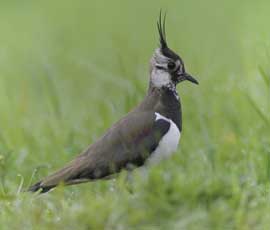Farmland bird numbers continue to fall

The number of farmland birds is continuing to fall in the UK despite efforts to increase wildlife-friendly farming practices, official figures show.
Over the past five years, the farmland bird population has fallen by 8%, which represents a slowing down of the decline over the previous five years.
The Farmland Bird Index – which covers 19 species reliant on the farmed countryside – was revealed in the annual Wild Bird Indicator, published on Thursday (17 October).
The farmland bird indicator has changed little since 2011, but in 2012 there were 50% fewer farmland birds than in 1970.
Most of the decline occurred between the late 1970s and early 1990s, which conservationists blame largely on rapid changes in farmland management.
Among the 19 species, farmland generalists have remained relatively stable over the past 40 years. While farmland specialists, such as corn bunting and grey partridge, continue to decline.
Turtle doves are the fastest declining species – down 95% since 1970. Greenfinch numbers are falling due to the disease trichomoniasis. Other species hit hard include lapwings (pictured above), down 63% since 1970, corn buntings (90%) and skylarks (59%).
Species that are doing well include jackdaws, whose numbers have increased by 140% since 1970, and woodpigeons, which are up 134%.
Conservationists have urged the government to allocate more incentives to farmers for introducing wildlife-friendly practices on farm, such as putting in place wildflower margins and skylark plots, leaving stubble unploughed over winter, not overgrazing land, and reducing the use of pesticide and fertiliser.
DEFRA is already considering a certification scheme to implement “greening” measures under the reform of the Common Agricultural Policy (CAP) and it is expected to switch 15% of direct payments to fund rural development measures.
Martin Harper, the RSPB’s conservation director, said: “The trend for farmland birds continues to go downwards. The decline has slowed, and wildlife-friendly farmers who put conservation measures in place on their land must be congratulated for their hard work.
“But if we are all going to work together to bring wildlife back to our countryside then the funding must be there for these measures to continue.”
CAP budget a ‘terrible deal’ for wildlife
